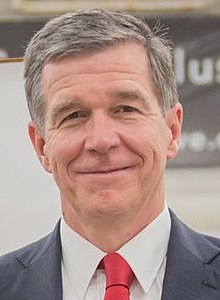| Governor of North Carolina | |
|---|---|
 Gubernatorial seal | |
 | |
since January 1, 2017 | |
| Government of North Carolina | |
| Status | |
| Member of | Council of State |
| Residence | Executive Mansion |
| Seat | Raleigh, North Carolina |
| Term length | Four years, renewable once consecutively |
| Inaugural holder | Richard Caswell |
| Formation | 1776 |
| Deputy | Lieutenant Governor of North Carolina |
| Salary | US$203,073 per year (2023) |
| Website | Official website |
The governor of North Carolina is the head of government of the U.S. state of North Carolina. Seventy-five people have held the office since its inception in 1776. The governor serves a term of four years and chairs the collective body of the state's elected executive officials, the Council of State. The governor's powers and responsibilities are prescribed by the state constitution and by law. They serve as the North Carolina's chief executive and are tasked by the constitution with faithfully carrying out the laws of the state. They are ex officio commander in chief of the North Carolina National Guard and director of the state budget. The office has some powers of appointment of executive branch officials, some judges, and members of boards and commissions. Governors are also empowered to grant pardons and veto legislation.
Historically, North Carolina has had a weak governor with limited authority. Unlike most of their counterparts in the United States, the North Carolina governor lacks line-item veto power, while additional executive authority is vested in other elected officials on the Council of State. While the state has grown increasingly politically competitive since the mid-20th century, Republicans have had difficulty in winning gubernatorial elections in North Carolina, and the office has usually remained in Democratic hands. The current governor, Democrat Roy Cooper, took office on January 1, 2017.
